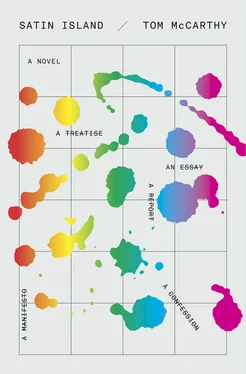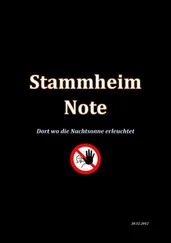4.6In my office, waiting for Peyman to come back to London, I began a dossier on oil spills. The oil spill that had started while I’d been in Turin was still making the news headlines, but I didn’t confine myself to that one: I read about all kinds of oil spill, going right back to before the First World War. An anthropologist’s not interested in singularities, but in generics. Oil spills are perfectly generic: there’s always one happening, or one that’s recently transpired, or, it can be said with confidence, one that’s on the verge of happening. I printed off tables of data, statistics about frequencies of oil spills, their clustering by region, year and company; images of tankers trailing long, black tails; of birds coated in oil; of people in white suits pushing brooms over vinyl-coated beaches. I looped on a spare laptop a video-clip that Daniel found me: it showed a close-up sequence of a few feet of sea-bed across which oil was creeping, carpeting the floor as it coagulated. The film had been captured by a hand-held underwater camera. You could see the diver’s other hand, his free one, reaching down into the shot, its white-gloved fingers feeling their way along this new-laid carpet or linoleum flooring’s edge until, finding a bump or buckle that allowed for entry, the hand slid under and pulled a section of it up. The oil, still unguent, stretched as it rose. Threads, strands and filigrees appeared, thinning as they lengthened before thickening and folding in on themselves as they were gathered back by the black, undulating mass. Every time I re-watched this last piece of footage, I sensed, or thought I sensed, a smell: the sweet, familiar scent of homemade toffee at the point — that magical instant — of caramelization. That’s what these pictures, even through the airless medium of water and the odourless relays of fibre-optic cable, through the mangling of digital compression, the delays, decays and abstractions brought about by storage and conversion, managed to transmit to me.
4.7As I watched this sequence over and over again (it was only about forty seconds long), other recognizable scenes began exuding from it. The diver’s gesture, for example — reaching down and pulling up the solidifying oil — was familiar as well: it was the gesture of a priest raising the holy water in his fingers, or a jeweler displaying a valuable necklace, or a zoologist handling a sleek, endangered snake. The diver, naturally, would have held the camera right beside his face, or perhaps in front of it, pressed up against his mask. This point of view produced another strange, confectionary-oriented pang of recognition; each time I watched, I felt my own face and the diver’s run together. I knew the look on his because it was the look on mine — not only then, watching the clip, but also once when, on a childhood holiday to San Francisco many years ago, I’d stood rooted to the pavement in front of a candy-store window in which taffy was being pulled, transfixed by the contortions of the huge, unmanageable lump (what child could eat all that ?) as the machine’s arms plied it, its endless metamorphoses in which, despite the regular, repeating movements that stretched and folded, stretched and slapped the taffy through the same shapes over and over again, I knew, even then, that no part of it, no molecule, would ever occupy the same spot in the overall formation twice.
4.8Eventually, after days spent immersed in this material, I received a call from Tapio upstairs. Peyman’s on his way back, his robot-voice intoned. Come and see him on Friday. Okay, I said. How’s the Great Report coming along? he asked before he hung up. Oh, you know, I answered: it’s finding its form. Five minutes after he’d called, Petr called too. Hey, he said: you know that goiter they were going to take out? Yes, I replied. Well, he told me, they did; and then they cut it up to look at it, and it was cancerous. Shit, I said. Yes, he said. Good thing they took it out, I said. No, U., he said, the goiter’s just an indicator: I’ve got thyroid cancer. Shit, I said again. Yes, he repeated — but it’s not that bad. How come? I asked. Because, he said, as cancers go, thyroid is a pretty lowly one: a lickspittle of cancers, a cadet. It’s almost never fatal. What do you have to do? I asked. I have to drink a bunch of iodine, he said. It soaks up all the bad cells and destroys them. It will make me radioactive. I’ll be going round town oozing rays and isotopes, like a plutonium rod. Far out, I said. Yes, he said: I’ll be able to look straight through girls’ clothes and see what colour underwear they’ve got on. Really? I asked. Of course not, he said. But I will ooze rays. Far out, I said again; I didn’t know what else to say. Yeah, he repeated: far out.
4.9On my way home that evening, I opened the free newspaper again, and found a photo of the airfield where the recently killed parachutist’s club was based. The photo showed a hangar and a runway cordoned off by police tape, with an officer standing in front of this to ensure that visitors and press stayed out. Something struck me as not quite right about the image. The officer was oddly poised — slightly unbalanced, as though starting to move off in such-and-such a direction but not yet fully launched into his walk. It wasn’t this that was wrong, though: it was the choice of restricted area itself. If a person had been shot or stabbed within the airfield’s boundary, it would have made sense for there to be a cordon round it; but this man had died on landing in a field some distance away. Presumably that field was cordoned off as well. But even that location didn’t accurately represent the one at which the crime had actually taken place: just where its consequences had played out, left their imprint. The crime itself, the moment of its actually-happening, would have occurred when, just after he threw his drogue out, as he awaited the familiar jolt and the ensuing drag, the reassuring easing of his downward plummet brought on by the opening of the parachute itself, the victim realized that these things hadn’t occurred, that he was still in freefall. The happening-moment would have taken place a second time after he’d pulled his ripcord and again felt no consoling bite, met with no purchase on the air around him; and a third when he’d attempted to deploy his reserve chute, equally fruitlessly. Did that mean there’d been three crimes instead of one? Perhaps. As I held the page above my knees, sat on a tube train shuttling through a tunnel, the question of the murder’s true location resolved itself for me: I realized that the crime scene, properly speaking, was the sky. Or, to flip this one back out as well: the sky was a crime scene.
5.1On the Company. No: on companies; on companies and crowds; whatever. In the fifties and sixties, people like me started conducting studies of corporations, presenting their findings back to the academy, for consecration as pure, unconditional knowledge. But, sometime in the seventies or eighties, all that changed: now anthropologists found themselves working for the corporation, not on it. So it was with me. It was the Company itself within whose remit I was operating. To whom did I report? The Company. Nonetheless, it was hard not to analyze the Company’s own make-up along anthropological lines. In fact, it was impossible. Forget family, or ethnic and religious groupings: corporations have supplanted all these as the primary structure of the modern tribe. My use of the word tribe here isn’t fanciful; it’s modern that’s the dubious term. The logic underlying the corporation is completely primitive. The corporation has its gods, its fetishes, its high priests and its outcasts (Madison was right about that part — just wrong in thinking this makes it exotic). It has its rituals, beliefs and superstitions, its pools of homespun expertise and craft and, conversely, its Unknowns or Unspokens. Peyman understood this. When he first hired me he told me that the Company needed an anthropologist because its entire field of operations lay in analyzing groups, picking apart their operations and reporting back on this, while at the same time both appreciating and refining its own status as a group, de facto subject to the same ongoing (and productive) scrutiny. At base, it’s all already anthropology, he said.
Читать дальше












